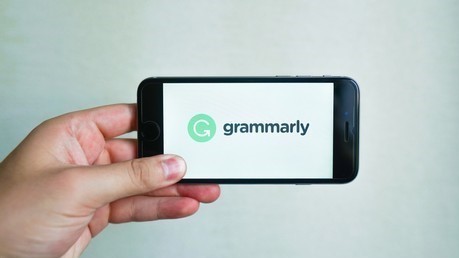Is Grammarly Cheating?

Since 2015, Grammarly has been used by millions of students, but does it provide them an unfair advantage?
February 4, 2022
We’re all familiar with the constant onslaught of Grammarly spam while browsing on our YouTube feeds. Although it initially drew the attention of internet users in 2015, its popularity exploded in 2020. As kids and adults transitioned from classrooms to screens at the onset of Covid, Grammarly rocketed from 1 million to 30 million daily users.
When speed typing or skipping a letter, Grammarly comes to the rescue. Those errors happen to the best of us, yet we often fail to realize it until the green or red lines let us know.
Since spellcheck’s origin in 1970, companies have continued to develop more sophisticated grammar checking for quality writing. Grammarly, which originated in 2009, has become the biggest name in recent editing history.
“Grammar matters [because] it’s necessary for clear communication. We’re all familiar with funny memes about commas saving lives [like] ‘Let’s eat grandma’ vs ‘Let’s eat, Grandma,’” said 8th-grade teacher, Mrs. Gossage.
Simple changes from placing commas to rewriting sentences have the potential to modify the entire meaning and tone of a text. It’s a subject guaranteed to be taught to students across generations because of the importance of relaying a clear message to the reader.
Not only does grammar communicate clearly, but it also frames one’s reputation. Many people unintentionally associate a person’s grammar with the level of trust that others have in them. Precise wording and flawless writing are often tied to our perception of scholarly attributes that reflect a person’s intellect and ability. Impressions like this aren’t new as ancient cultures like the Chinese had a similar outlook on calligraphy.
”[Correct grammar] makes a great first impression; there’s nothing worse than reading an application that’s full of errors. It’s awfully hard to trust someone to be a responsible member of a [teaching] staff when they can’t remember the difference between your and you’re, for example,” said Mrs. Gossage.
However, with all the benefits of correct grammar, is Grammarly considered cheating, as it edits our words to create an unearned appearance of top-level writing?
According to one Grammarly review, “Although students are unlikely to be aware of the hundreds of grammatical suggestions and conventions the site covers, they can become aware of patterns within their writing and steadily improve. The real-time tips will spur reflection and help kids build confidence over time, especially when combined with individual conferences and meaningful feedback.”
Students who use editing tools do tend to become more comfortable with their writing once they are encouraged to avoid repetitive errors. They may begin to notice patterns in their flaws and mature in their writing abilities by correcting them.
“[Grammarly] helps. It reflects the mistakes I have to correct. [Most of the time] I speed type all assignments. I usually make a lot of spelling mistakes and get mixed up in grammar, and Grammarly is always there to check it for me,” said 7th grader Nishna P.
In a Grammarly Survey Analysis taken by student users, “Eighty-four percent of the surveyed students believe that Grammarly improves their grades in general. Thanks to Grammarly, 45% of the students reported that their grades increased by half a grade, 30% by a full grade, and 9% by more than a full grade.”
Grammarly is a game-changer when it comes to the editing battlefield. It provides the potential to raise writing grades while showing the difference between a decent and ideal word or sentence. While Grammarly doesn’t magically provide an ‘A’ on an assignment, it does allow the writer to contemplate a mistake or clarify a thought.
According to Atutor, “When a correction is needed, Grammarly gives suggestions instead of answers. It offers feedback that gives teachable moments. Enhanced vocabulary and writing clarity are positive outcomes when using Grammarly.”
“I do whatever it tells me to do and sometimes I look back and double-check if it’s really grammatically correct, but most of the time I usually let it change whatever. I think it’s an automatic ‘do the suggestions’ because I got used to the computer grammatically checking and correcting something I misspelled, so I usually let it do what it does,” said 8th grader, Olivia GS.
Although Grammarly is a browser extension, it provides a quick teaching tool for students of all grade levels. It cannot automatically correct an error without approval nor give direct answers. Only suggestions are made, which permits writers to dismiss them at will.
“Whenever [Grammarly] gives the wrong suggestion, I have to look at the spelling and make sure it fits with the sentence. [Sometimes] it doesn’t fit and I click ‘add to the dictionary’ so Grammarly will know that’s the word I am going for,” said Nishna P.
When using the editing platform, small emojis at the bottom right-hand corner of the writer’s document conveys the tone of their writing. This allows the writer to recognize the manner in which something is conveyed, which may be expressing an unintentional mood.
“I love Grammarly. It tells me about my author’s voice which I find really helpful as a teacher, because sometimes we get kind of demanding, ‘Put three things down!’, ‘Do that!’ But it reminds me that I’m writing for people, not computers. It helps me try to be more kind and descriptive while I’m writing for my students,” said Mrs. Daley.
No matter how helpful Grammarly can be, we all must be aware of its limitations.
“You could possibly not learn the rules and just say ‘I’m going to just have this fix it up for me,’ so I could see you becoming too dependent upon it. So when you’re in a situation where you can’t use it, it might become an impediment,” said Mrs. Daley.
As students begin to get too comfortable with Grammarly, they may depend on letting it fix the minor details without thought, causing a writer to rely too much on the extension. As we simply rubber stamp words or letters, we risk allowing the grammar check to do the job for us, resulting in an unearned outcome.
“[I let Grammarly do the work] most of the time. I just let it run through [my assignment], and I think it can help me. But at the same time, I shouldn’t rely on Grammarly all the time. I should also find my own way of writing,” said Nishna P.
So is Grammarly considered cheating? If we know the boundaries of when or when not to use it, then it’s generally harmless. As long as we are writing original pieces and striving to understand our mistakes, it’s okay to have a little grammar support. With simple features like vocabulary enhancement or spellcheck, Grammarly is a positive learning tool for students across subjects and grade levels.






